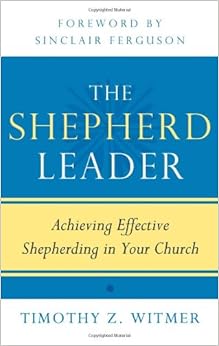Are There Two Types of Elders?
I'm reading through Witmer's "The Shepherd Leader." This is an excellent and challenging book for any church elder.
 In the third chapter Witmer recalls first how the church strayed from the leading
of a plurality and parity of elders.
This shift began in the second century but was greatly accelerated by
Cyprian in the third century. Cyprian
tied church leadership to the Levitical model, with elders becoming
priests. “Bishop” became a title that
vested a single man with immense authority over the church and its leadership.
In the third chapter Witmer recalls first how the church strayed from the leading
of a plurality and parity of elders.
This shift began in the second century but was greatly accelerated by
Cyprian in the third century. Cyprian
tied church leadership to the Levitical model, with elders becoming
priests. “Bishop” became a title that
vested a single man with immense authority over the church and its leadership.
 In the third chapter Witmer recalls first how the church strayed from the leading
of a plurality and parity of elders.
This shift began in the second century but was greatly accelerated by
Cyprian in the third century. Cyprian
tied church leadership to the Levitical model, with elders becoming
priests. “Bishop” became a title that
vested a single man with immense authority over the church and its leadership.
In the third chapter Witmer recalls first how the church strayed from the leading
of a plurality and parity of elders.
This shift began in the second century but was greatly accelerated by
Cyprian in the third century. Cyprian
tied church leadership to the Levitical model, with elders becoming
priests. “Bishop” became a title that
vested a single man with immense authority over the church and its leadership.
The biblical idea of elders and deacons began to be restored
in the reformation, beginning with Wycliff, advancing greatly with Calvin and
his student Knox, the latter two of which split the role of elder into a teaching pastor and a ruling elder.
The former was to teach the word, the latter was to “seek the fruit of
the same in the people” (Knox.)
According to Witmer, these elders were to be men of good character, but
they need not possess the gift of teaching. Witmer's view here builds on a small point dropped into the previous chapter: “All
elders, including teaching elders (pastors), are called to shepherd the flock,
but not all elders have the gift of teaching, though they should be apt to
teach” (p43.) This is based primarily on two scriptures:
“...he who leads, with
diligence...” (Romans 12:8)
“The elders who rule well are to
be considered worthy of double honor, especially those who work hard at
preaching and teaching.” (1 Timothy 5:17)
So how do these verses stand up to what is stated in 1
Tim 3:2 where Paul says that an overseer must be “able to teach.” Didaktikos.
Also…
“The Lord’s bond-servant must
not be quarrelsome, but be kind to all, able to teach, patient when wronged,”
(2 Timothy 2:24)
“And He gave some as apostles,
and some as prophets, and some as evangelists, and some as pastors and
teachers,” (Ephesians 4:11)
“The Lord’s servant must… holding
fast the faithful word which is in accordance with the teaching, so that he
will be able both to exhort in sound doctrine and to refute those who
contradict.” (Titus 1:9)
So is Paul declaring that there are two types of elders in 1
Tim 5:17? Are ruling and teaching exclusive
from each other? A plain reading of that passage shows
that the statements are inclusive: those who rule and teach. Paul is emphasizing
the need to provide financial support for those elders that have devoted
themselves to the ministry work: such men (and their families) should not be
left to starve on the street. He is not
using this passage to differentiate roles, but to ensure that full-time elders
are provided for by the church.
So why would anyone conclude otherwise? Where does the contrast of “gift of teaching”
against being “able to teach” originate?
I suspect that it comes down to either tradition or pragmatism. At the time of Calvin and Knox the established
church was very hierarchical, with great power and authority invested in a
church’s pastor, the regional bishop etc.
Perhaps this was too much to undo at the time. Also, from a practical perspective, any
congregation would likely have men of stalwart faith and character that, nonetheless,
lack the ability to teach. Such men are
natural leaders and have much to offer a church, and so it is natural to look
for such a leadership role in Scripture… and we always find what we are looking for.
I respectfully disagree with Witmer (and many other fine men) that there
are two types of elder. Such an approach
perpetuates the very ecclesiastical hierarchy that the reformers were
trying to do away with. It also elevates
unqualified men into a position of leadership, and that can be ruinous to a
church.
“Gift of teaching” is not a formal biblical term, and can be
misleading. Rather, we should simply
ask, “Is the man able to teach? Does he
have a firm grasp of biblical teaching, and can he effectively use that to
encourage some and to refute others?” If so, he has met one of the necessary qualifications for becoming an elder. And elders are called to both teach and rule.
Comments